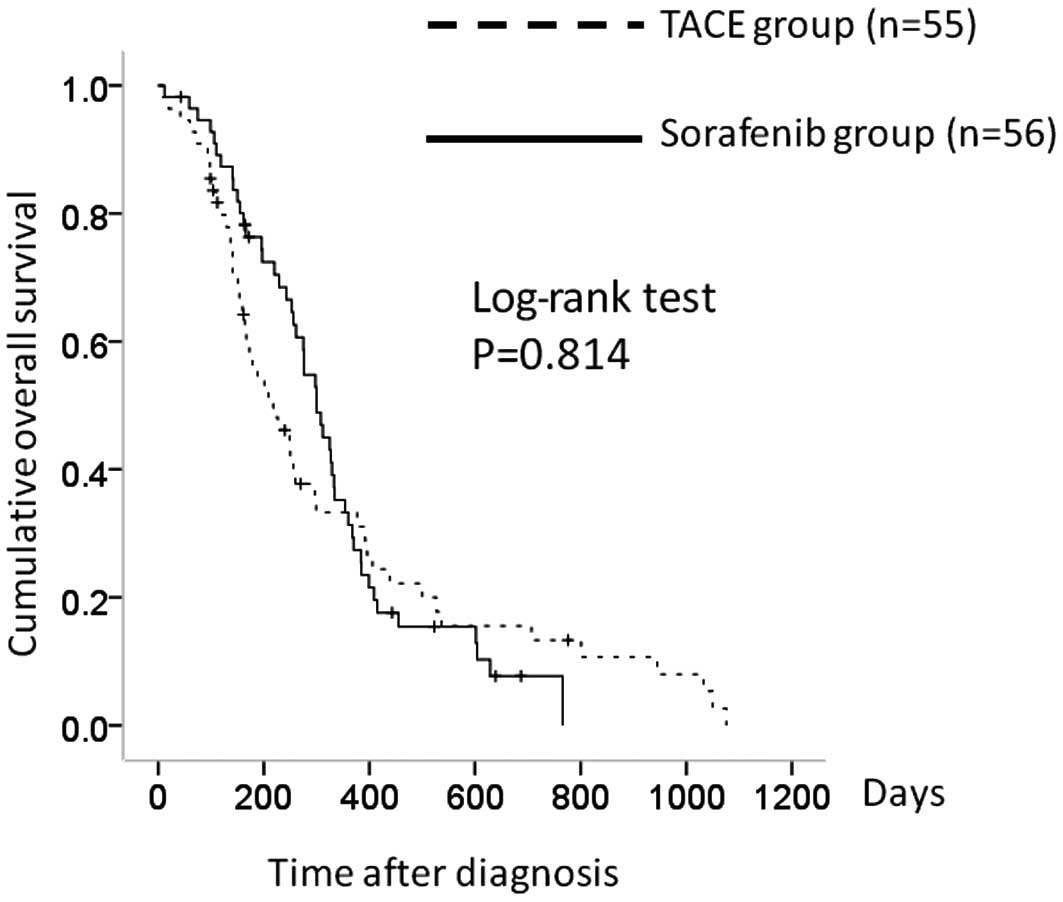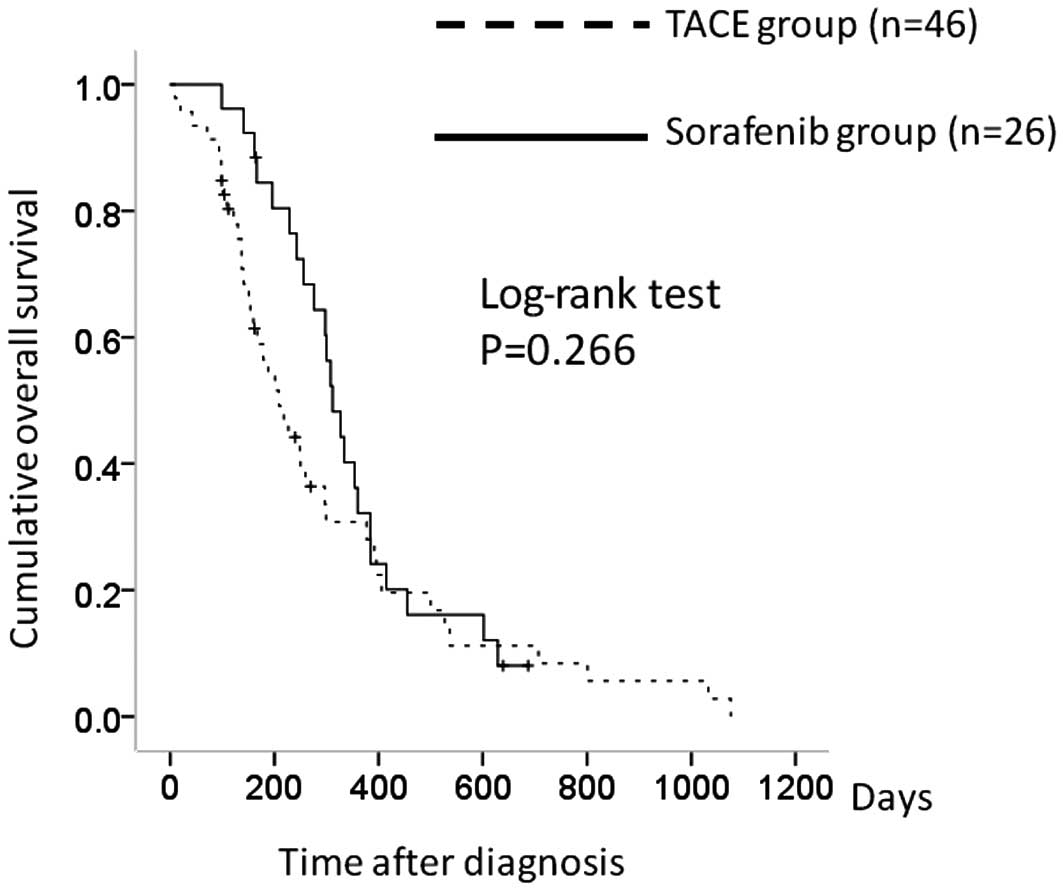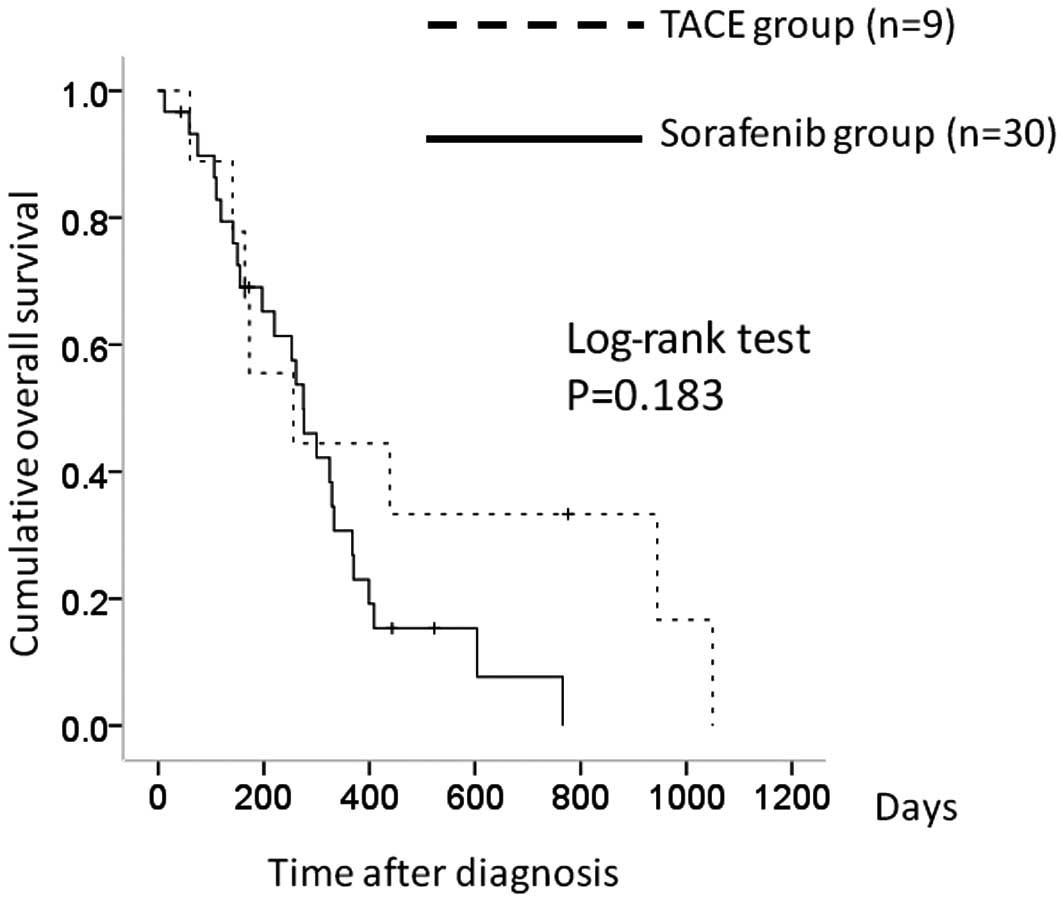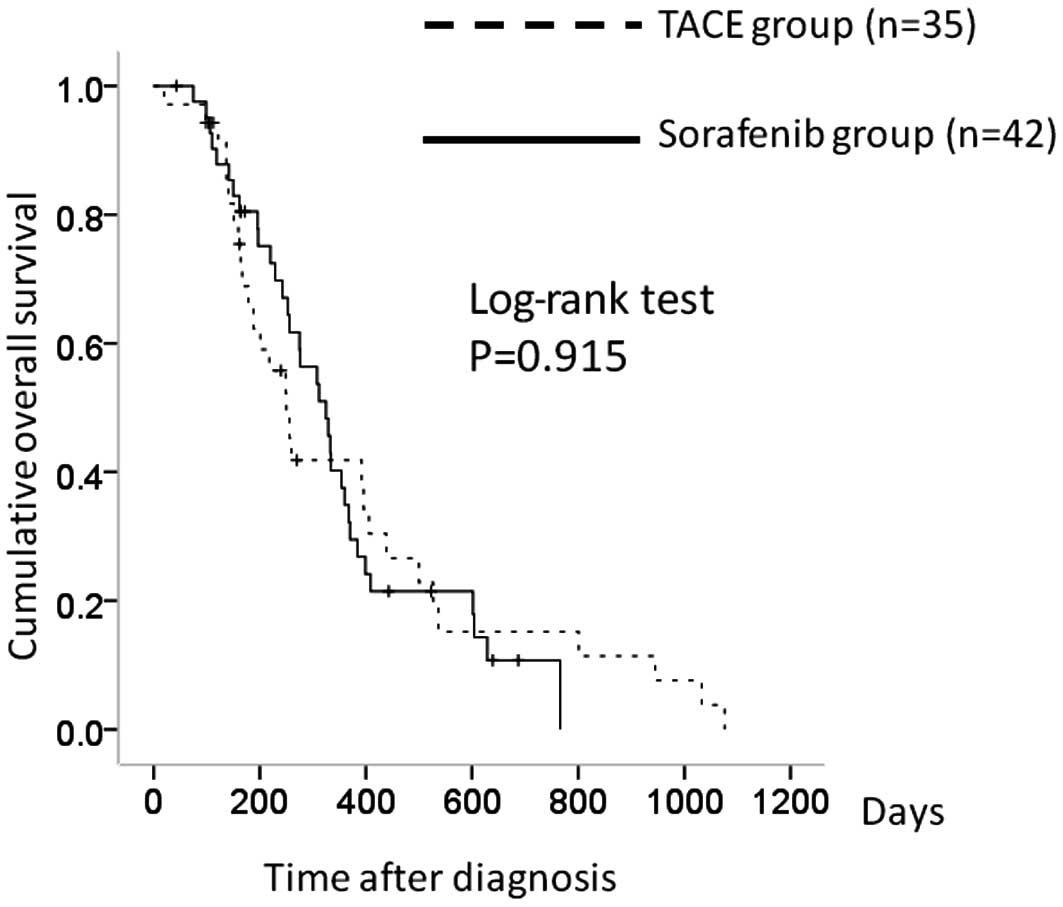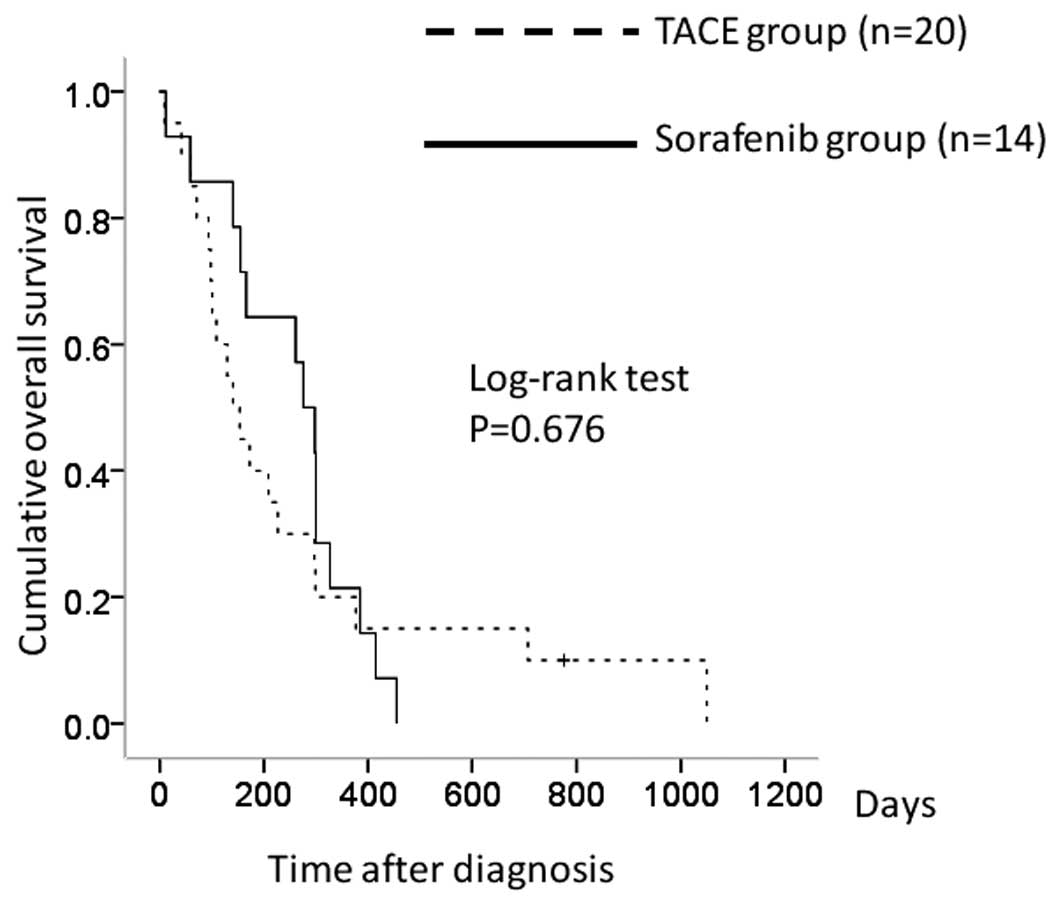|
1.
|
Curley SA, Izzo F, Ellis LM, Nicolas
Vauthey J and Vallone P: Radiofrequency ablation of hepatocellular
carcinoma in 110 patients with cirrhosis. Ann Surg. 232:1694–1702.
2000. View Article : Google Scholar
|
|
2.
|
Allgaier HP, Deibert P, Zuber I,
Olschewski M and Blum HE: Percutaneous radiofrequency interstitial
thermal ablation of small hepatocellular carcinoma. Lancet.
353:1676–1677. 1999. View Article : Google Scholar : PubMed/NCBI
|
|
3.
|
Okuda K: Hepatocellular carcinoma: recent
progress. Hepatology. 15:948–963. 1992. View Article : Google Scholar
|
|
4.
|
Lencioni: Loco-regional treatment of
hepatocellular carcinoma. Hepatology. 52:762–773. 2010. View Article : Google Scholar : PubMed/NCBI
|
|
5.
|
Nishikawa H, Osaki Y, Kita R and Kimura T:
Hepatic arterial infusion chemotherapy for advanced hepatocellular
carcinoma in Japan. Cancer. 4:165–183. 2012. View Article : Google Scholar : PubMed/NCBI
|
|
6.
|
Llovet JM, Ricci S, Mazzaferro V, Hilgard
P, Gane E, Blanc JF, de Oliveira AC, Santoro A, Raoul JL, Forner A,
Schwartz M, Porta C, Zeuzem S, Bolondi L, Greten TF, Galle PR,
Seitz JF, Borbath I, Häussinger D, Giannaris T, Shan M, Moscovici
M, Voliotis D and Bruix J; SHARP Investigators Study Group:
Sorafenib in advanced hepatocellular carcinoma. N Engl J Med.
359:378–390. 2008. View Article : Google Scholar : PubMed/NCBI
|
|
7.
|
Cheng AL, Kang YK, Chen Z, Tsao CJ, Qin S,
Kim JS, Luo R, Feng J, Ye S, Yang TS, et al: Efficacy and safety of
sorafenib in patients in the Asia-Pacific region with advanced
hepato-cellular carcinoma: a phase III randomised, double-blind,
placebo-controlled trial. Lancet Oncol. 10:25–34. 2009. View Article : Google Scholar : PubMed/NCBI
|
|
8.
|
Llovet JM and Bruix J: Systematic review
of randomized trials for unresectable hepatocellular carcinoma:
chemoembolization improves survival. Hepatology. 37:429–442. 2003.
View Article : Google Scholar
|
|
9.
|
Llovet JM, Real MI, Montaña X, Planas R,
Coll S, Aponte J, Ayuso C, Sala M, Muchart J, Solà R, Rodés J and
Bruix J; Barcelona Liver Cancer Group: Arterial embolisation or
chemoembolisation versus symptomatic treatment in patients with
unresectable hepatocellular carcinoma: a randomised controlled
trial. Lancet. 359:1734–1739. 2002. View Article : Google Scholar
|
|
10.
|
Lencioni R, Chen XP, Dagher L and Venook
AP: Treatment of intermediate/advanced hepatocellular carcinoma in
the clinic: how can outcomes be improved? Oncologist. 15:42–52.
2010. View Article : Google Scholar : PubMed/NCBI
|
|
11.
|
Schwarz RE, Abou-Alfa GK, Geschwind JF,
Krishnan S, Salem R and Venook AP; American
Hepato-Pancreato-Biliary Association; Society of Surgical Oncology;
Society for Surgery of the Alimentary Tract: Nonoperative therapies
for combined modality treatment of hepatocellular cancer: expert
consensus statement. HPB (Oxford). 12:313–320. 2010.PubMed/NCBI
|
|
12.
|
Lee HS, Kim JS, Choi IJ, Chung JW, Park JH
and Kim CY: The safety and efficacy of transcatheter arterial
chemoembolization in the treatment of patients with hepatocellular
carcinoma and main portal vein obstruction. A prospective
controlled study. Cancer. 79:2087–2094. 1997. View Article : Google Scholar : PubMed/NCBI
|
|
13.
|
Ishikawa T: Future perspectives on the
treatment of hepatocellular carcinoma with cisplatin. World J
Hepatol. 1:8–16. 2009. View Article : Google Scholar : PubMed/NCBI
|
|
14.
|
Peng ZW, Guo RP, Zhang YJ, Lin XJ, Chen MS
and Lau WY: Hepatic resection versus transcatheter arterial
chemoembolization for the treatment of hepatocellular carcinoma
with portal vein tumor thrombus. Cancer. 22:Feb 22–2012.(Epub ahead
of print). View Article : Google Scholar
|
|
15.
|
Park JW, Koh YH, Kim HB, Kim HY, An S,
Choi JI, Woo SM and Nam BH: Phase II study of concurrent
transarterial chemoembolization and sorafenib in patients with
unresectable hepatocellular carcinoma. J Hepatol. 56:1336–1342.
2012. View Article : Google Scholar : PubMed/NCBI
|
|
16.
|
Sansonno D, Lauletta G, Russi S, Conteduca
V, Sansonno L and Dammacco F: Transarterial chemoembolization plus
sorafenib: a sequential therapeutic scheme for HCV-related
intermediate-stage hepatocellular carcinoma: a randomized clinical
trial. Oncologist. 17:359–366. 2012. View Article : Google Scholar
|
|
17.
|
Bruix J and Sherman M; Practice Guidelines
Committee, American Association for the Study of Liver Diseases:
Management of hepatocellular carcinoma. Hepatology. 42:1208–1236.
2005. View Article : Google Scholar
|
|
18.
|
Kudo M and Okanoue T; Japan Society of
Hepatology: Management of hepatocellular carcinoma in Japan:
consensus-based clinical practice manual proposed by the Japan
Society of Hepatology. Oncology. 72:2–15. 2007. View Article : Google Scholar : PubMed/NCBI
|
|
19.
|
Llovet JM, Di Bisceglie AM, Bruix J,
Kramer BS, Lencioni R, Zhu AX, Sherman M, Schwartz M, Lotze M,
Talwalkar J and Gores GJ; Panel of Experts in HCC-Design Clinical
Trials: Design and endpoints of clinical trials in hepatocellular
carcinoma. J Natl Cancer Inst. 100:698–711. 2008. View Article : Google Scholar
|
|
20.
|
National Cancer Institute: Common
terminology criteria for adverse events, version 3.0. http://ctepcancergov/reporting/ctc.htmluri
Published August 9, 2006. Accessed August 2010.
|
|
21.
|
Niu ZJ, Ma YL, Kang P, Ou SQ, Meng ZB, Li
ZK, Qi F and Zhao C: Transarterial chemoembolization compared with
conservative treatment for advanced hepatocellular carcinoma with
portal vein tumor thrombus: using a new classification. Med Oncol.
December 27–2011.(Epub ahead of print).
|
|
22.
|
Luo J, Guo RP, Lai EC, Zhang YJ, Lau WY,
Chen MS and Shi M: Transarterial chemoembolization for unresectable
hepatocellular carcinoma with portal vein tumor thrombosis: a
prospective comparative study. Ann Surg Oncol. 18:413–420. 2011.
View Article : Google Scholar : PubMed/NCBI
|
|
23.
|
Chung GE, Lee JH, Kim HY, Hwang SY, Kim
JS, Chung JW, Yoon JH, Lee HS and Kim YJ: Transarterial
chemoembolization can be safely performed in patients with
hepatocellular carcinoma invading the main portal vein and may
improve the overall survival. Radiology. 258:627–634. 2011.
View Article : Google Scholar : PubMed/NCBI
|
|
24.
|
Welker MW and Trojan J: Anti-angiogenesis
in hepatocellular carcinoma treatment: current evidence and future
perspectives. World J Gastroenterol. 17:3075–3081. 2011.PubMed/NCBI
|
|
25.
|
Leelawat K, Laisupasin P, Kiatdilokrut A,
Pongtongpool T, Narong S, Samkhumphim N and Ket-Horm S: The effect
of doxorubicin on the changes of serum vascular endothelial growth
factor (VEGF) in patients with hepatocellular carcinoma after
transcatheter arterial chemoembolization (TACE). J Med Assoc Thai.
91:1539–1543. 2008.
|
|
26.
|
Wang B, Xu H, Gao ZQ, Ning HF, Sun YQ and
Cao GW: Increased expression of vascular endothelial growth factor
in hepatocellular carcinoma after transcatheter arterial
chemoembolization. Acta Radiol. 49:523–529. 2008. View Article : Google Scholar
|
|
27.
|
Niizeki T, Sumie S, Torimura T, Kurogi J,
Kuromatsu R, Iwamoto H, Aino H, Nakano M, Kawaguchi A, Kakuma T and
Sata M: Serum vascular endothelial growth factor as a predictor of
response and survival in patients with advanced hepatocellular
carcinoma undergoing hepatic arterial infusion chemotherapy. J
Gastroenterol. March 1–2012.(Epub ahead of print).
|
|
28.
|
Llovet JM, Pena C, Lathia C, Shan M,
Meinhardt G and Bruix J; on behalf of the SHARP Investigators Study
Group: Plasma biomarkers as predictors of outcome in patients with
advanced hepatocellular carcinoma. Clin Cancer Res. 18:2290–2300.
2012. View Article : Google Scholar : PubMed/NCBI
|
|
29.
|
Zhu AX, Duda DG, Sahani DV and Jain RK:
HCC and angiogenesis: possible targets and future directions. Nat
Rev Clin Oncol. 8:292–301. 2011. View Article : Google Scholar : PubMed/NCBI
|















